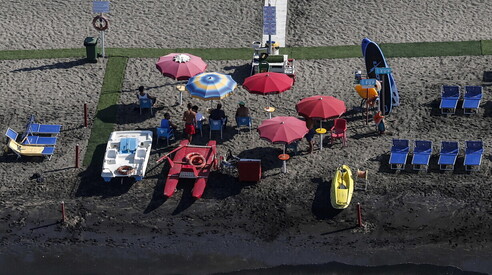Never before have so many Italians been on vacation. Empty beaches? Destinations have changed.


(Ansa photo)
soundcheck
According to Eurostat, more Italians have gone on holiday than ever since 2004. Fewer crowded beaches aren't due to the crisis, but to new destinations and low-cost travel. This is why Italian tourism must adapt to changing demand.
On the same topic:
Never before have so many Italians been able to afford a vacation in recent years . Indeed, despite the photographs of deserted coastlines and the alarms raised by some media outlets and politicians, the numbers tell a different story: more and more families are managing to get away. This is precisely what Eurostat says, a finding echoed in recent days by several newspapers and political parties but often misinterpreted. According to the European statistical agency, which annually interviews a representative sample of the population, last year 31 percent of Italians were unable to afford a vacation of at least a week. One in three. A figure that alarmed many, but which is actually the lowest ever recorded since records began in 2004, as first highlighted by Pagella Politica. Twenty years ago, the figure was 38.7 percent, and after the sovereign debt crisis, it reached 51 percent. Looking at the rest of Europe, Romania, Greece, Bulgaria, Portugal, Croatia, Spain, Slovakia, Cyprus, and Lithuania fare worse than us. The European average is 27 percent, lower than in Italy, while among the large countries, Poles, French and Germans can afford more holidays than us.
And don't think that Italians used to go on vacation more. According to ISTAT, in the 1960s—the era of black-and-white photos of families crammed into Fiat 500s, trunks tied with string, and coolers—only 21 percent of Italians took at least one leisure trip lasting more than four nights. In the 1970s, the figure rose to 35 percent, and ten years later—thanks to the boom on the Riviera Romagnola, with its endless beach umbrellas—it reached 46 percent . The statistics institute hasn't updated the series since 2014, a terrible year for tourism, but it's very likely that even more Italians are traveling today, given the encouraging numbers released by Eurostat. Despite stagnant wages and the recent wave of inflation. In short, things weren't better when things were worse. They were just worse.
How can we explain the regained purchasing power of holidays, in a country where wages have been growing too slowly for 20 years and productivity has stagnated? Once again, ISTAT (National Institute of Statistics) provides the answer. Compared to a decade ago, over 2 million more people are working in Italy today, almost all of them on permanent contracts (and over 50, due to the increase in the retirement age). This has supported family budgets: even with wages virtually unchanged in real terms, staying in work longer has increased overall income. Household purchasing power has risen by almost ten percentage points from its low point in 2012 and has now fully recovered from post-pandemic inflation, although it remains dramatically lower than in 2009 (one of the few cases in Europe). The aid measures from the Draghi and Meloni governments, which have reduced the tax burden by over €30 billion since 2021, have also strengthened family budgets. Those most protected are low- and middle-income taxpayers, whose wages, according to the latest INPS annual report, have almost fully recovered their purchasing power thanks to tax and social security discounts.
If some Italian beaches appear emptier today, the reason is not the presumed but nonexistent general impoverishment, but rather a shift in preferences that has been observed for some time: tourists are more attracted to out-of-the-ordinary experiences and destinations, foreign itineraries made more accessible by low-cost flights, and prices at many beaches that discourage some customers . And so, while some establishments are counting free sunbeds, other sectors of tourism—from European capitals to exotic destinations—are registering record numbers. This is a challenge for the Italian tourism industry, already surpassed in Europe by Spain and France in terms of tourist numbers, which is being called upon to abandon old vested interests and reinvent its offerings.
More on these topics:
ilmanifesto





